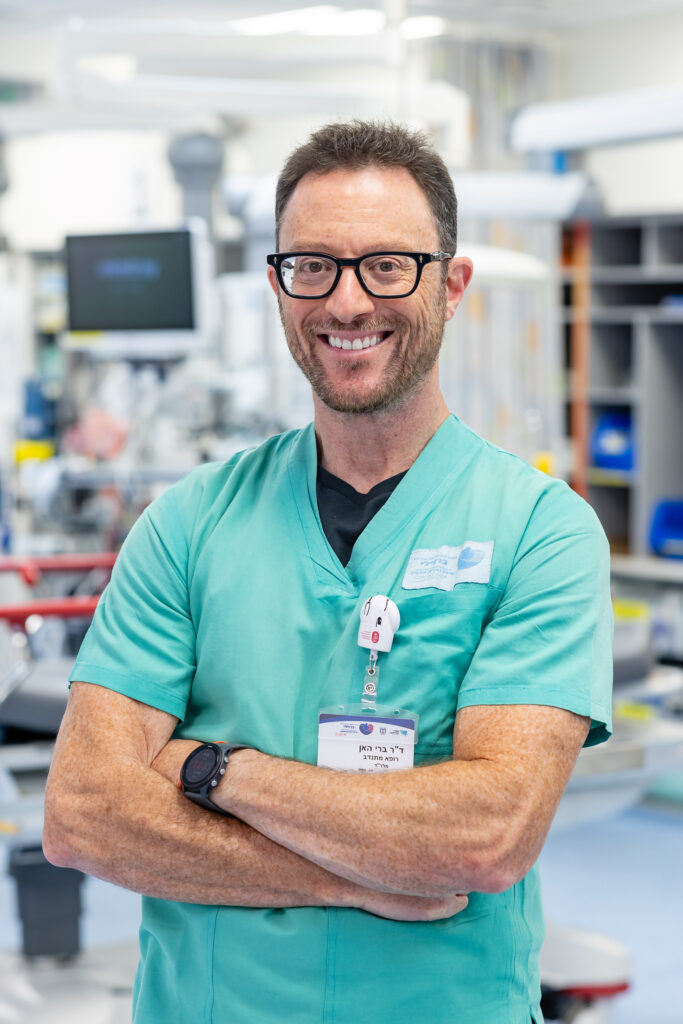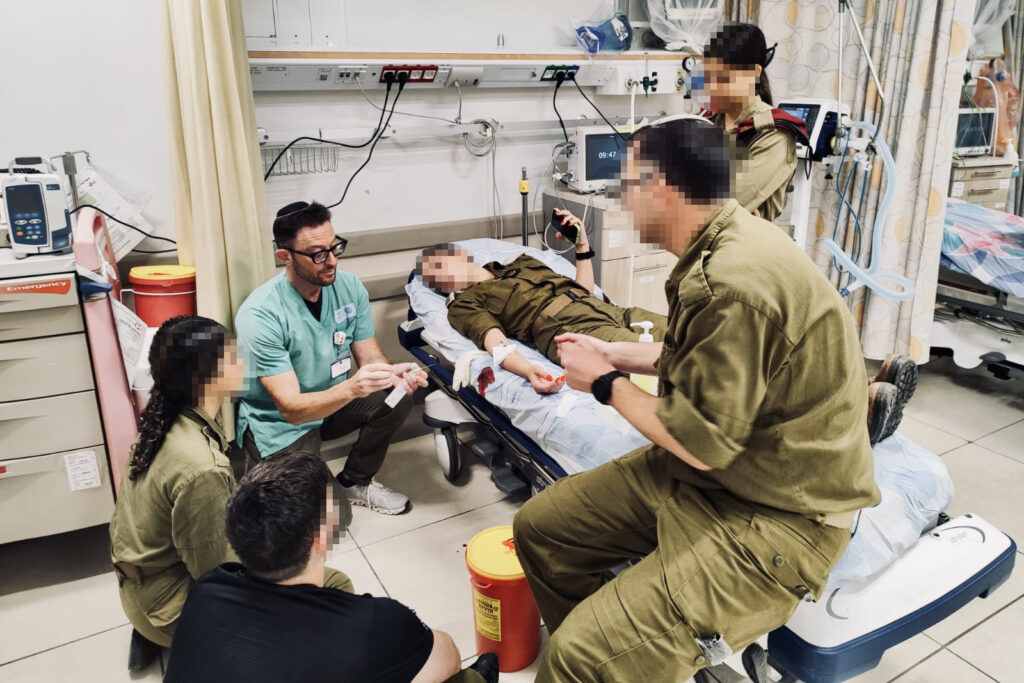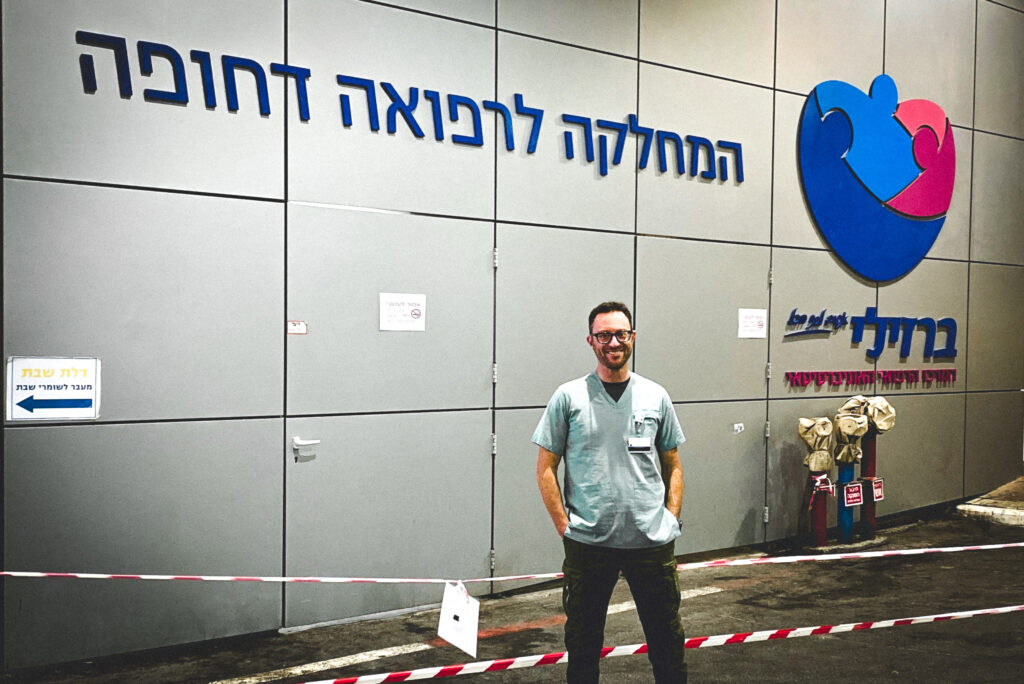 “Wheels up tomorrow.” Still tired from a late-night shift, I read these words on my phone with excitement and nervousness. Seeking clarity, I made my way to my father’s grave, quietly posing questions to him in my heart. Barely half an hour later, my phone rang. The caller ID displayed “dad,” which left me temporarily speechless. To my surprise, it was my father’s former business partner calling from a now-defunct line. “I heard you’re headed to Israel. You’re going to help a lot of people, and your father would be so proud.” It was as if my tefillot had been answered, even though it was through an unexpected Verizon connection. I turned to my wife, Shira, who responded with her usual unwavering faith. “There’s no question here. You need to do this.”
“Wheels up tomorrow.” Still tired from a late-night shift, I read these words on my phone with excitement and nervousness. Seeking clarity, I made my way to my father’s grave, quietly posing questions to him in my heart. Barely half an hour later, my phone rang. The caller ID displayed “dad,” which left me temporarily speechless. To my surprise, it was my father’s former business partner calling from a now-defunct line. “I heard you’re headed to Israel. You’re going to help a lot of people, and your father would be so proud.” It was as if my tefillot had been answered, even though it was through an unexpected Verizon connection. I turned to my wife, Shira, who responded with her usual unwavering faith. “There’s no question here. You need to do this.”
Upon arriving in Ashkelon, my first impression was of the constant booms of artillery and shelling, their vibrations resonating through my chest and the buildings, creating an almost tangible presence. Our apartment for the next two weeks offered a surreal juxtaposition with a stunning sea view contrasted sharply with the visible northern Gaza about five miles to the west. Despite the caution to watch out for the shrapnel damage on the porch, we were reassured that these accommodations would soon feel like home.
The following morning, we made our way to Barzilai Hospital, a 600-bed facility situated on the top of a hill, about a mile from our apartment. Barzilai had already sustained three rocket strikes before our arrival. The ER at Barzilai is unique since it is underground within a fortified bunker. They told us we wouldn’t hear the sirens, which came like clockwork every evening. We were issued badges and immediately shown into the ER without time to change into scrubs. Our job was to take care of the wounded soldiers and Palestinians. The sense of achdut was palpable as we teamed up with Russian, Arab and Israeli doctors. Soldiers were treated in Agaf Shalosh, a specially designated wing of the ER.
My first encounter was with a soldier who had heroically shielded his mefaked (commander). Suffering from shrapnel wounds and burns on both arms, we sedated him to debride his injuries. The next night, during Kabbalat Shabbat, we again gathered around him, this time singing and dancing in a moment so touching there wasn’t a dry eye in the room.
On the first afternoon, we met an incoming soldier in the ambulance bay, and together, the entire team transported the patient into the trauma room and began assessing and treating the patient in a coordinated effort. Many people were in the room, but suddenly, we looked around and saw an unfamiliar face. “Are you family?” the ER chief asked. “Of course,” he answered. “How are you related?” He said, “What do you mean, we are all Jews, kulanu mishpacha.” We all paused for a heartfelt moment. We then promptly kicked him out.
As ER doctors, we have this attitude of “been there, done that,” like nothing can surprise us anymore. What struck me in Barzilai was that the physical trauma was similar to what I had seen before, yet the stories behind each case were a world apart. For me, it was a first to hear of a patient walking into the hospital and casually mentioning “an RPG just hit my house, and now I’ve got a headache.”
During my time at Barzilai, we predominantly encountered shrapnel wounds. These wounds, often a mix of cement from buildings and metal from rockets, presented a challenge due to the possibility of extensive internal damage. Contrary to popular belief, we left most of the shrapnel alone. (Sorry, Grey’s Anatomy fans, we regularly leave bullets and shrapnel inside!)
 Each day, we came across a variety of challenging cases. There was a soldier who had fallen off his tank, resulting in multiple fractured ribs and a punctured lung. The team treated a soldier who had sustained a gunshot wound to the face from friendly fire. Another soldier was brought in with an abdominal injury, leading to evisceration. We also cared for a Palestinian woman whose arm had been severely mauled when a Hamas terrorist threw her in front of a military canine.
Each day, we came across a variety of challenging cases. There was a soldier who had fallen off his tank, resulting in multiple fractured ribs and a punctured lung. The team treated a soldier who had sustained a gunshot wound to the face from friendly fire. Another soldier was brought in with an abdominal injury, leading to evisceration. We also cared for a Palestinian woman whose arm had been severely mauled when a Hamas terrorist threw her in front of a military canine.
While there were casualties and heart-wrenching stories, every day was also marked by miraculous occurrences. It almost felt as if bullets deliberately avoided vital organs. Witnessing these remarkable survivors, we knew a Higher Power was watching over us. One soldier, with shrapnel dangerously close to his spinal cord, incredibly had no neurological deficits. Another soldier narrowly escaped death when a bullet aimed at him struck his gun, resulting in just a temporary eye injury. He kept the damaged fragment of his rifle close, reluctant to let it go but willing to show it to us. One soldier suffered only a laceration after he was shot in the helmet. Another survived a gunshot wound to the neck without vital organ damage. Despite their injuries, many soldiers refused stretchers or wheelchairs, their first concern being when they could return to duty. The strength and spirit on display were nothing short of heroic. The soldiers emphasized that their mission wasn’t driven by revenge but by the need to ensure the safety of their families and homeland.
 As ER doctors, we’re trained to compartmentalize, but in Israel, the emotional toll was heavier—probably because these people were my family of Am Yisrael. I found myself, like many others, overwhelmed with emotions, often crying at night after returning home. Thinking back on my experience, the impression of an unwavering spirit resonates deeply. My time in Israel was not just about providing medical care. It was about connecting with people in their most vulnerable moments. The feeling of unity was palpable across the country as people came together to offer unwavering support for one another. I left with a sense of pride in having served and countless memories that continue to inspire me.
As ER doctors, we’re trained to compartmentalize, but in Israel, the emotional toll was heavier—probably because these people were my family of Am Yisrael. I found myself, like many others, overwhelmed with emotions, often crying at night after returning home. Thinking back on my experience, the impression of an unwavering spirit resonates deeply. My time in Israel was not just about providing medical care. It was about connecting with people in their most vulnerable moments. The feeling of unity was palpable across the country as people came together to offer unwavering support for one another. I left with a sense of pride in having served and countless memories that continue to inspire me.
Reflecting on those intense days, I’m reminded of something the rabbi at Barzilai said. “It’s not a beit cholim (house of sick people). It’s a beit refuah (house of healing).” Indeed, amidst the chaos and suffering, Barzilai Hospital was a place where healing occurred, not just physically but also in the bonds formed between people from different backgrounds, united in their dedication to saving lives and finding hope in the darkest moments.
Am Yisrael Chai.
Binny Hahn is an emergency medicine physician and research director with over 20 years of experience. His career, characterized by dedication in emergency medicine, is equally influenced by his strong connection to Israel and its values.










